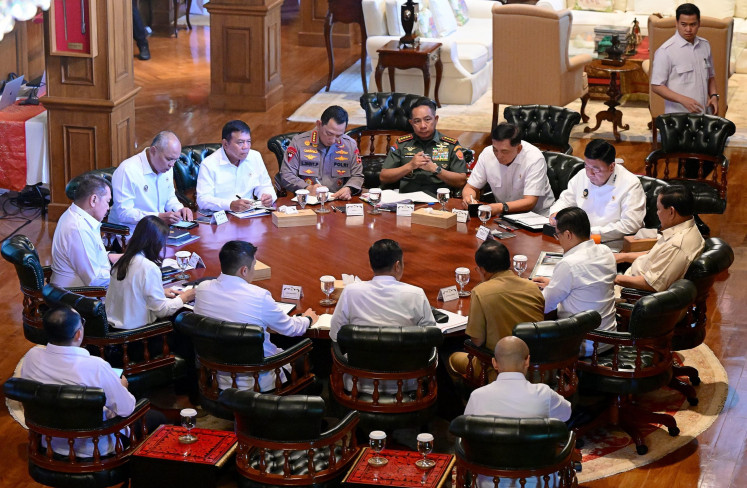Popular Reads
Top Results
Can't find what you're looking for?
View all search resultsPopular Reads
Top Results
Can't find what you're looking for?
View all search resultsSocial media as a safe site for subverting a teacher's power
Three senior high school students from Siak regency, Riau province, have of late been under a media spotlight
Change text size
Gift Premium Articles
to Anyone
T
hree senior high school students from Siak regency, Riau province, have of late been under a media spotlight. Having lampooned their teacher via social media, they were temporally expelled from school, before eventually being allowed to return.
The school apparently felt offended by the students' Facebook status, which read 'When we're late, we get punished, if teachers are late, they just escape penalty.'
There's little doubt that the presence of high-tech gadgets has made people highly literate and critical. While people can keep detached from others, on their social media they can still exercise 'authority' as those who have the right to express who they actually are. Social media has created a safe site for them to comfortably explore their identities without necessarily conforming to established discourses.
It is in this context that the case of the three students above needs to be understood. First, the classroom is a microscopic power-laden site, with teachers often free to exercise control over students. Opposing this authority by directly showing overt resistance is considered subversive, especially where a culture of 'total obedience' is still inculcated into students.
Second, schools keep students under surveillance by censoring students' patterns of verbal behavior (i.e. their identities) that don't conform to the established school regulations as they are often deemed institutionally improper and undesirable. With strict school regulations, students may feel that their preferred identities are under threat.
Social media like Facebook and Twitter have been considered by many as cozy and safe sites to show off one's true identity. Thus, the three high school students found it more effective to subvert their teachers' power through social media. Voicing their critical thoughts on hidden sites free from surveillance is a common strategy of the oppressed.
We have witnessed how social media has created furor over the use of dissent by the common people against officials considered to have abused power.
Interestingly, critical voices may not always take a linguistic form but are also manifested through such practices as pictorial parodies, satires and jokes, the use of which are facilitated and disseminated by social media.
The students' posted messages can be interpreted as covert resistance against power inequality and injustices faced in school. The students' blatant and direct call for a fair treatment of tardiness would have been highly unlikely, given their subservient role and lack of bargaining power. Thus, being critical in an open public site, like a school, is avoided at all cost as students would be likely to face institutional penalties.
Through this surveillance-free space, they have not only celebrated freedom to opine, but they also display a critical attitude against any effort to undermine their identities.
It is however ironic that the students ought to face penalties due to their criticism of their teacher's tardiness, while advances in digital technology have paved the facilitation of critical thinking in education.
Yet, though the school might have felt irked about the students' posted messages, the detached, critical voices the students developed via social media should not be undermined. What their criticisms have shown us is that the students, while seemingly obedient and docile in classrooms, have managed to develop complex oppositional discourses outside of the classroom that outsmart their teachers. This is indeed a witty strategy to subvert the domination of the teacher's power.
_______________
The writer is an associate professor at Atma Jaya Catholic University, Jakarta.










